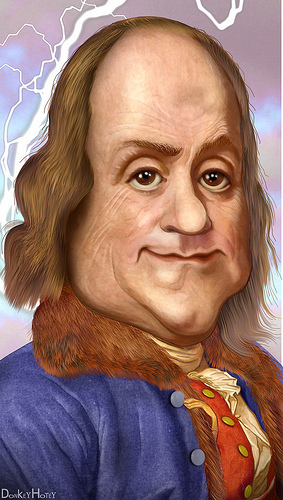Or, Why I Vote Democrat
 We didn’t have graphic novels when old ass LOLGOP was growing up. You could get a super-sized Archie or a book of Peanuts. But they didn’t have anything good like that in Germain Street School’s library. It was mostly encyclopedias, novelas about horses and picture books. What they did have was a small display shelf that held a series of books that told the biographies of the Founders in a comic book style.
We didn’t have graphic novels when old ass LOLGOP was growing up. You could get a super-sized Archie or a book of Peanuts. But they didn’t have anything good like that in Germain Street School’s library. It was mostly encyclopedias, novelas about horses and picture books. What they did have was a small display shelf that held a series of books that told the biographies of the Founders in a comic book style.
There were all kinds of things wrong with these books. Chiefly they generally ignored the greatest moral error of the era: slavery. The books had a Jeffersonian subtext of “Of course, we knew it was wrong but you have to have a country before you can have a civil war.”
Also, the books also fixated on a “Great Man” theory of history, though wives were always prominent fixtures in a Nancy Reagan sort of way. History, I’d say, is a mass movement with all sorts of influencers coalescing behind, around and against people. Fixating on the stars ignores sky-wide list of credits that makes most great endeavors possible.
Still, the cartoon Founders I found in these books were fascinatingly diverse and quirky. All were portrayed as giant intellects with a compulsion to serve even when they could have avoided it. Thus their lives made sweet little graphic novels. Aaron Burr’s story especially touched on the complexity and darkness that have come to characterize many of the early graphic novels.
The main thing the authors of the series seemed to want to make clear is that these were men who were all driven by ideas. Eventually—in a victory for all mankind—they came together to claim their liberty in the name of an idea: All men are created equal.
Of course, since then we’ve expanded “men” to mean humans—not just white male property owners—but we should remember that wasn’t true at the time. This isn’t to denigrate the Founders but to remind us that even great men make great mistakes.
It’s easy to become convinced that these outstanding individuals each individually had the answer to every question. But, clearly, it was the collective wisdom of the time, largely shaped by James Madison, that made our Constitution possible.
I love our Constitution—the separation of powers, separation of church and state. And I love that it wasn’t perfect. It was the product of compromise that gave rural states huge advantages and left some questions about how federalism should work.
How do you know the Constitution wasn’t perfect? The best parts are the first ten amendments: The Bill of Rights.
I love that America was born to be improved. And, with the stunning exception of 2001-2008, it generally has. We has a surplus to spend when one of the greatest environmental champions in the world won the popular vote in 2000. But you know what happened next. In 2008, we proved that, with enough of a turnout, you cannot lose on a technicality. I pray that’s still true in a post-Citizens United world.
That’s why, though I respect the Occupy movement’s gripes and desire to improve the world, I refuse to give up on the amazing system we have forged from one simple idea: all of us are created equal thus all of all of us deserve liberty.
The idea of equality leading to liberty is what progressivism is to me. A society that does its best to provide equal opportunities to all, regardless of race, class, gender or creed, is a society that frees mankind to bring new ideas to life.
That’s why I love America.
[CC image by the esteemed DonkeyHotey | Flickr]



